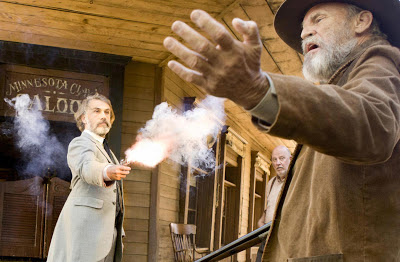 Former dentist, Dr. King Schultz, buys the freedom of
a slave, Django, and trains him with the intent to make him his deputy bounty
hunter. Instead, he is led to the site of Django's wife who is under the hands
of Calvin Candie, a ruthless plantation owner.
Former dentist, Dr. King Schultz, buys the freedom of
a slave, Django, and trains him with the intent to make him his deputy bounty
hunter. Instead, he is led to the site of Django's wife who is under the hands
of Calvin Candie, a ruthless plantation owner.
There exist certain features which, if found in a
movie, point out that the director is Quentin Tarantino. You can always tell
the Tarantino film apart from the rest – he is absolutely unique in what he is
doing. He is in love with films of 80’s and 90’s; he devotes a lot of time to
the work with camera, and he is able to mimic the camera work of almost any era
he wishes to; his characters are charismatic and memorable; he loves to think
that he films the advertisement of Heinz ketchup by the looks of the amount of
blood that is spilled. But most important of all are the dialogs – you will
never find this kind of dialogs in a movie by other directors. They can be
empty in substance, they may not convey any message or lead the plot sequence,
but they are interesting to listen to, they are witty, smart, sharp and
effervescent. The dialogs are Tarantino’s trademark, and his contribution to
the cinema (at least for now) is definitely putting the art of writing dialogs
to the next level.
So what a relief it is to find out that Django
Unchained is totally a Tarantino thing! To say that the dialogs are brilliant
would be to say nothing: they are absolutely fascinating, up to the par with
Pulp Fiction. Hilarious scene about holes in the bags by night raiders, ingenious
art of negotiation by Dr. Schultz, a lot of grumbling by Steven – the list can
go on forever. Potential quotes fly around faster than you are able to take
note of them, but every phrase is there at the right place and at the right
time (watch out for the scene of reunion of Django and Broomhilda, it is a gem).
So even if the movie was just a set of those scenes, it would be already a
great watch.
But there is much more to it. It possesses all the
other features of Tarantino films too. The plot is interesting and it does not
disappoint, even though it unavoidably gets somewhat predictable. Action is
there too, the main fight is intense and yes, lots, lots, lots of blood and
gore, sometimes totally unnecessary in terms of common sense, but totally
necessary in terms of Tarantino movie. The camera does the usual, trademark
activities, flying around people, quickly zooming into a face or just admiring
the scenery of snow-covered mountains. Characters are amazing. In fact,
Tarantino spent more time giving little details to the supporting characters than
to Django himself, the result being that you simply cannot wait for new
characters to be introduced. The accents, the manners of speech, clothes –
everything plays to the general atmosphere.
And after mentioning characters, actors must be told
about too. Although I cannot say much about Jamie Foxx as Django apart from him
being okay, I can tell a lot about Christoph Waltz as Dr. Schultz. He made the character likable and
distinct, he gave charisma and wit to the German bounty hunter. Leonardo DiCaprio
as Calvin Candie is amazing too. In fact, I believe that it is a scandal that
DiCaprio is still not in the possession of an Oscar, if not for this role
alone, then for all the other roles.
Tarantino is one of the most controversial directors
out there; one cannot be sure whether he simply copies other people, or puts up
a nice parody, whether he is a genius with a vision or grindhouse-style movie
producer. Wherever you stand on the issue, you cannot deny that he is capable
of making brilliant films. Django is certainly one of those brilliant films,
which will be quoted, remembered and rewatched for a long time.
Another film jewel from Tarantino. Must see.






No comments:
Post a Comment